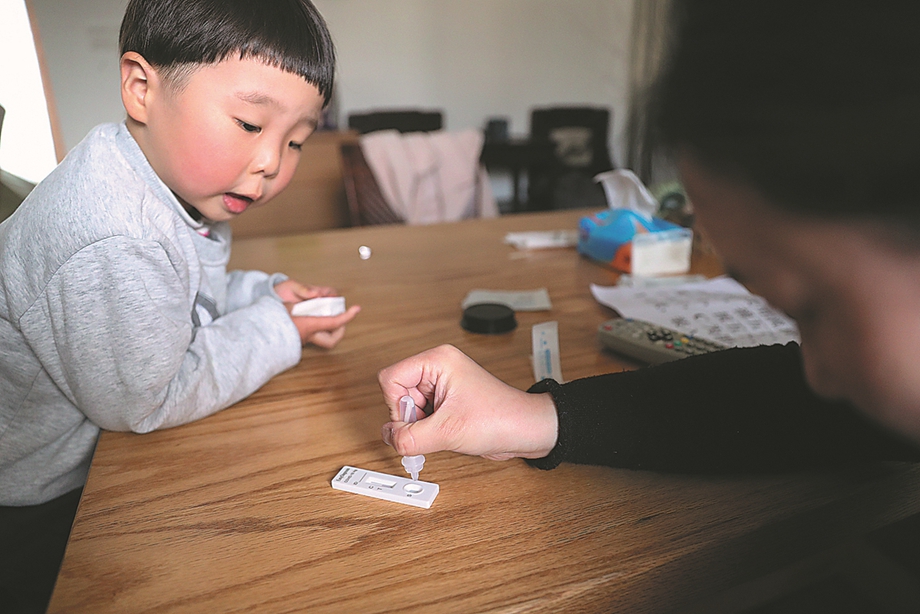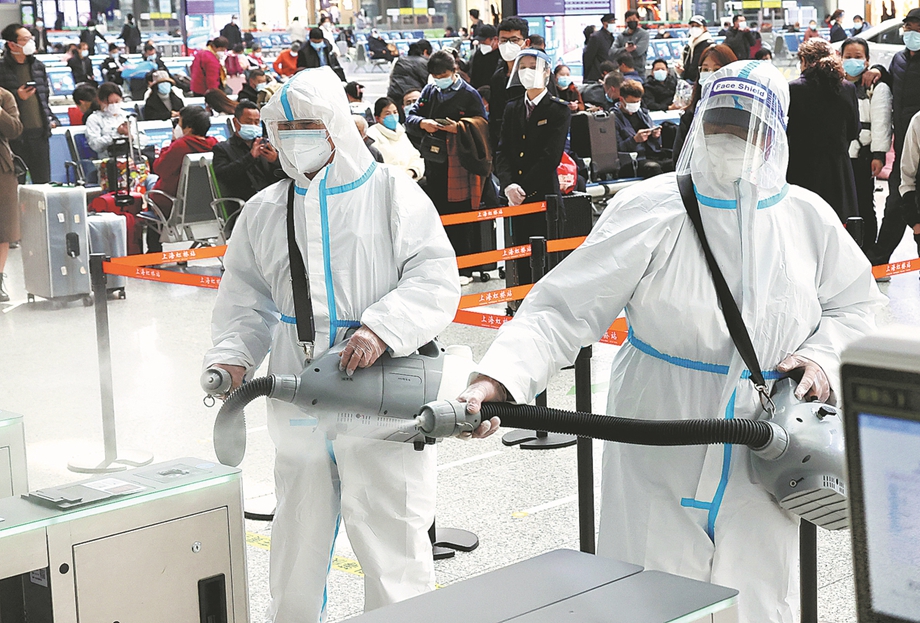East Shanghai under phased lockdown
 A Shanghai resident drops a swab sample into an antigen test strip at her home on Saturday. The city provided residents with nucleic acid or antigen tests over the weekend as part of its "dynamic zero-COVID" policy to be able to resume full citywide operations at the lowest cost as soon as possible. ZHANG HENGWEI/CHINA NEWS SERVICE
A Shanghai resident drops a swab sample into an antigen test strip at her home on Saturday. The city provided residents with nucleic acid or antigen tests over the weekend as part of its "dynamic zero-COVID" policy to be able to resume full citywide operations at the lowest cost as soon as possible. ZHANG HENGWEI/CHINA NEWS SERVICE
- Residents told not to leave homes, with closed loop for businesses
- Buses, subways, ferries, taxis, and online car-hailing services suspended in locked down regions
Shanghai is kicking off a new round of nucleic acid testing for residents on Monday morning to curb the spread of the novel coronavirus, protect people's lives and achieve zero spread outside virus transmission chains as soon as possible.
The municipal government announced on Sunday night that the testing will begin in regions east of the Huangpu River. From 5 am Monday to 5 am Friday, the regions will be locked down while residents are tested.
The rules also apply to key subdistricts in Puxi, west of the river, which are already under lockdown and tested frequently.
From 3 am Friday to 3 am April 5, other regions in Puxi will be locked down while residents are tested.
Shanghai authorities said on Sunday that the city recorded 2,676 new locally transmitted COVID-19 infections, including 45 confirmed cases, on Saturday. Daily new infection numbers have climbed since the city's worst outbreak started early this month.
The city government will require all residential compounds within locked down regions to implement strict lockdown measures and all residents must stay at home. Residents and their cars will be allowed to enter neighborhoods, but they will not be allowed to leave. Express parcels will only be allowed to be delivered to the gates of neighborhoods.
All enterprises in locked down regions must operate under closed-loop management or allow employees to work from home, except for those offering essential public services.

Workers disinfect ticket gates in a waiting hall at Shanghai Hongqiao Railway Station, March 26, 2022. [Photo/Xinhua]
Buses, subways, ferries, taxis, and online car-hailing services will be suspended in locked down regions. Vehicles related to epidemic control measures, emergency medical services, security, urban operation and emergency response will be able to use roads after obtaining official approval, but the unnecessary use of other vehicles will be prohibited.
The city government said those who do not participate in the nucleic acid screening will lose their green health QR codes and have difficulty accessing public venues later.
It also reiterated the necessity of ensuring sufficient supplies of daily necessities and food and emphasized the importance of green channels to meet the emergency medical needs of the public, especially pregnant women, patients undergoing hemodialysis, radiotherapy and chemotherapy, and others requiring special treatment.
Those who refuse to cooperate, hinder epidemic prevention and control, or cause other serious consequences will be investigated and held legally liable.
On Friday, the first central quarantine site renovated from an exhibition hall to receive mild confirmed cases and asymptomatic infections in the city was put into use and received more than 500 patients. The venue can accommodate 2,000 patients.
Four hospitals jointly dispatched an 840-member medical force to the site, including some people who aided Wuhan, the capital of Hubei province, during its epidemic peak in 2020.
Among them was Zha Qiongfang, a doctor with the respiratory medicine department at Renji Hospital who was a member of the first Shanghai medical contingent to arrive in Wuhan.
"Two years ago, we traveled to help friends. Now, we feel the duty to safeguard our hometown when Shanghai's epidemic control is at its most critical juncture," she said.
Renji Hospital said that psychologists were also deployed to help patients regulate their emotions and reduce anxiety when quarantined in a relatively closed space.
Seven other such sites, including hospitals and indoor stadiums, have also been made ready after renovations, according to the city's health authority.